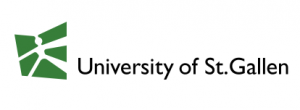St.Gallen Collegium Research & Outreach Fellowships
THEME: Digital Sovereignty

As of fall 2025, St.Gallen Collegium will be home to researchers from different disciplines and generations, ranging from post-doctoral researchers to emeriti and independent scholars. Fellows will pursue their own research and a joint project focusing on a theme related to one of the Grand Challenges of our time.
For the second Collegium year 2026/2027 (September 1, 2026-May 31, 2027), St.Gallen Collegium will award fellowships to scholars whose work addresses the theme: Digital Sovereignty
About the Theme
Amidst the re-shaping of the world order and the increasing fragmentation one sphere remains deeply entangled, interconnected, and interdependent: the digital world. Digital technologies have become critical infrastructure of economies, states – and civil societies. Yet states have taken note of the price they (might) have to pay when they heavily rely on innovation and technology developed and based abroad. Consequently, the notion of “digital sovereignty” has gained traction in policy debates.
Already in 2021, then German Chancellor Angela Merkel, Danish Prime Minister Mette Frederiksen, former Estonian Prime Minister Kaja Kallas, and former Finnish Prime Minister Sanna Marin addressed the European Commission, declaring that it was “time for Europe to be digitally sovereign.” Their call to action has been echoed vehemently by European industry leaders in the wake of the 61st Munich Security Conference: They pressed the need for an “industrial policy strategy to reduce our dependencies in critical technologies, while focusing on selected initiatives to overcome Europe’s structural challenges.”
Yet digital sovereignty is more than a preoccupation of European states. The World Economic Forum’s definition elucidates that the issue concerns not only states but reaches all levels down to the individual citizen: “Digital sovereignty, cyber sovereignty, technological sovereignty and data sovereignty refer to the ability to have control over your own digital destiny – the data, hardware, and software that you rely on and create.” In addition, some fear that technology may become autonomous, with AI turning into a new species – this would, in turn, raise even more challenging questions. Consequently, we require diverse, interdisciplinary perspectives on and approaches to digital sovereignty.
St.Gallen Collegium invites researchers from all fields who are interested in a solution-oriented discourse on digital sovereignty. Possible avenues of research include:
- Digital autonomy: What does autonomy mean in a digital context? How are ideas about the sovereign self changing in the digital age?
- The digitally sovereign citizen: How can citizens' democratic rights and obligations be conceived in a sovereign manner if their dependence on digital providers cannot be determined by the state? Is the sovereign citizen of today necessarily a global citizen, or neither?
- Platforms and economic power: How can oligarchic and monopolistic structures be reined in or prevented? What regulation can balance the need for control against the need for innovation?
- Digital sovereignty in and of corporations: How can companies secure control over their digital infrastructure, data, and technologies so that they can decide independently how and with whom they use digital resources?
- Digital governance: How can states, international and supranational organizations, and nonstate actors assert and control power over digital infrastructure, data, and standards? How can control be exercised without hampering innovation? How can oligarchic and monopolistic structures be reined in or prevented?
- Global asymmetries in digital sovereignty: How do histories of colonialism and patterns of dependency shape current struggles over digital control, and what forms of digital sovereignty are emerging in the Global South? How can developing countries avoid replicating colonial patterns in the digital realm? How do development programs shape digital governance models in recipient countries?
- Sovereignty in a more-than-human world: What can, and what should “sovereignty” mean in the digital world? Should it include non-human actors? And if yes, how? Are humans at risk of losing their autonomy as decisions are passed down to AI?
We are particularly y interested in projects that interrogate the interplay between the technical and the normative, the local and the global, and the individual and the institutional.
Research Fellowships
Expectations
Fellows are expected to be in residence in St.Gallen or in its environs during the academic year 2026/2027 and spend their work days on the campus of the University of St.Gallen. They will be provided shared office space and access to all campus amenities. During their Collegium year, fellows must be free from any obligations at their home institutions so that they can focus on their research in St.Gallen.
Fellows will be able to dedicate two-thirds of their Collegium time to their own research projects related to the annual theme. The Collegium will also make sure to introduce the fellows to St.Gallen faculty who share their interests and whose research endeavors might be relevant to them.
In addition, the seven research fellows will spend a third of their time establishing and developing a joint project with the support of a St.Gallen faculty member who acts as convenor and moderator. Fellows are thus expected to interact regularly, to be willing and keen on learning from each other, to collaborate across disciplinary boundaries, and to engage with invited faculty and guests who can contribute to the joint project.
St.Gallen Collegium will organize events throughout the academic year to engage with the University community and the public. Fellows are expected to join select events, to present and discuss their own work as well as aspects of the joint project.
The working language at St.Gallen Collegium is English.
Types of Research Fellowships
St.Gallen Collegium is awarding the following research fellowships:
- 3 Senior Fellowships: senior fellows are established scholars of any field; Associate Professors/Readers, Full Professors, emeriti/emeritae, as well as independent scholars are welcome to apply. They receive a stipend of CHF 130,000 (gross) for the academic year (September-May). Three fellowships are named in honor of our donors: the Ria und Arthur Dietschweiler Fellowship, Michael Hilti Fellowship, and the SENN Fellowship.
- 2 Junior Fellowships for young scholars from the global south: two fellowships are designated for advanced doctoral students or early postdoctoral scholars who are currently working at a university in the global south, preferably at an African university. They receive a stipend of CHF 80,000 (gross) for the academic year (September-May).
- Hans Christoph Binswanger Fellowship for a post-doctoral scholar: see separate application procedure.
Application
Please note that the Hans Christoph Binswanger Fellowship requires different documents. Please see the specific call for application.
For all other research fellowships, please include the following documents in your application:
- CV; please highlight any experience you may have in interdisciplinary collaborative projects.
- List of publications; please highlight three key publications pertaining to the annual theme.
- Letter of motivation (max. 2 pages).
- Short outline (max. 2 pages) of the research you plan to pursue during your Collegium year.
- If you are an advanced doctoral student or postdoctoral scholar, please include two letters of recommendation as well.
Please combine all documents in one PDF file and submit it by September 25, 2025 via e-mail to collegium@unisg.ch. Short-listed candidates will be invited for an interview via Zoom in October. Fellows will be notified after the final selection by the Advisory Board by the end of November.
Should you have any questions regarding the application process or the Collegium as such, please contact Prof. Claudia F. Brühwiler, the academic director: claudiafranziska.bruehwiler@unisg.ch.
Outreach Fellowship
Profile & Expectations
Each year, an outreach fellow joins St.Gallen Collegium and works with the research fellows in the context of the joint project. The outreach fellow is part of the collaborative process and simultaneously a bridgebuilder who makes the work and findings of the Collegium more accessible to a broader audience.
Outreach fellows can come from various fields and work with a wide range of media or other means and tools to let the public partake in the results of the Collegium's collective effort. St.Gallen Collegium welcomes applications by science journalists, writers, independent scholars, artists, and other creative minds. Outreach fellows work effectively in both English and German. In contrast to the research fellows who reside throughout the year, St.Gallen Collegium is open to establishing a residency schedule with the outreach fellow. Should the outreach fellow be in residence during the entire academic year, they will receive a stipend of CHF 100,000 (gross); for shorter stays, the stipend will be adapted accordingly.
Application
Please include the following documents in your application as an outreach fellow:
- CV; please highlight any experience you may have working alongside researchers.
- Letter of motivation (max. 2 pages)
- Short outline (max. 2 pages) of your interest in the annual theme and of your vision how to make the Collegium’s work and findings accessible to a broader audience.
Please combine all documents in one PDF file and submit it by September 25, 2025 via e-mail to collegium@unisg.ch. Short-listed candidates will be invited for an interview via Zoom in October. The fellow will be notified after the final selection by the Advisory Board at the end of November.
Should you have any questions regarding the application process or the Collegium as such, please contact Prof. Claudia F. Brühwiler, the academic director: claudiafranziska.bruehwiler@unisg.ch.
